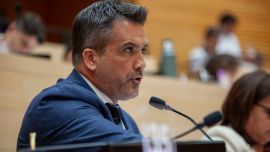The collateral damage accompanying the coronavirus pandemic has taken on a life of its own this month, completely overtaking all efforts to place Covid-19 in a strictly medical perspective.
Even now, after three months, there are almost 60,000 people in the world for every person infected and the death toll is 0.0007 percent of world population, many of them with one foot already in the grave – the death rate is 100 times higher among those over 80 than those under 40. And yet this asymptomatic influenza variant has exploded far beyond the dimensions of a public health problem, closing down entire countries, crippling international transport and tourism, pulverising stock markets and in general triggering the worst global crisis in several decades, already eclipsing the worldwide 2008-2009 subprime meltdown when the phrase “toxic assets” had no medical connotations.
Within that context for those who want to play the blame game, who is right and who is wrong, the panic-mongers or the denialists? A tricky question. Taking one entirely random example to illustrate the complexity, the decision to suspend the Indian Wells Masters tennis tournament because of one single confirmed case of coronavirus in its Californian county might look like an extreme rush of mindless panic at one level. But weighing the losses of US$20-30 million (even without paying the prize money and running costs) against the lawsuits arising from its highly international attendance producing more illnesses makes the decision look like the purest financial prudence. This example could be multiplied for countless sectors across the planet.
Attributing this entire crisis to the impact of coronavirus underestimates its causal complexity. If stock markets worldwide have had such a disastrous week (with Wall Street falling almost eight percent on Monday and 10 percent on Thursday, despite technical rebounds at other moments), the original impetus came not so much from coronavirus as oil prices losing almost a quarter of their value to fall below US$35 last Monday – a level hammering another nail into the coffin of Vaca Muerta shale already hit by erratic policies, it might be said in passing. But nor does this permit us to switch the blame from Covid-19 to petrol because the two factors are interwoven – the plunge was quickly traced to the price war between Russia and Saudi Arabia but in a longer term it anticipates slumping future demand from the transport paralysis and other negative effects of coronavirus.
Yet talking of market meltdown, this black cloud could have a silver lining for Argentina at least. Bond values have sunk so low that the debt haircut envisaged by the government – down from an initial trim of 25-30 percent to a scalping of twice those levels although this has yet to be admitted – might even look semi-attractive. But it is a fine line because if the bonds fall too low, they could be snapped up by so-called “vulture funds,” whose holdout strategy of litigation over negotiation would make default virtually impossible to avoid.
Alongside the multi-billion economic losses and the profound social dislocation of the myriad preventive measures, a crisis of political leadership should also be included among the casualties of coronavirus. Some of the criticism is unfair – political reflexes are often measured against wildly exaggerated fears with people faulting governments for not sharing their sense of panic. But coronavirus has so clearly upstaged every other issue in the public mind that there is the temptation to focus everything against the common enemy while letting often important pending questions slide – not least here in Argentina.
Apart from possibly easing debt negotiations, President Alberto Fernández can garner political dividends from the least divisive of the issues he has faced so far – striking a Churchillian pose in his Thursday evening nationwide broadcast to announce a national sanitary emergency and a raft of preventive measures. But there is a danger that a government which has spent over three months dithering over the fundamental questions (postponing structural reforms in the name of prioritising debt negotiations and then not even coming to grips with those) now has the perfect excuse for completing its first 100 days without any decisive action – when those first 100 days are so vital to the success of any government.
Much more to be said but if the president sought a Churchillian style, Thursday’s measures may not even be “the end of the beginning” in the Churchillian phrase.



















Comments